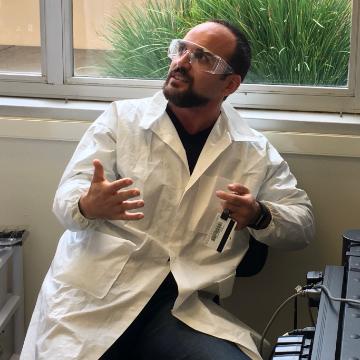Araci Receives Prestigious NSF CAREER Award

Emre Araci, Associate Professor of Bioengineering, has received a prestigious National Science Foundation CAREER award of $518,406 in support of his work on next-generation wearable movement sensors that can help improve the lives of patients with musculoskeletal disorders and stroke survivors, advance sports medicine, and more.
Musculoskeletal disorders (e.g., arthritis, herniated disc, etc.), on the rise due to an aging population, are the leading cause of disability in the world, Araci reports. Up to now, the main course of action in response to these conditions has been to improve the availability and efficacy of physical rehabilitation. But just how successful are those rehab efforts? Dr. Araci aims to quantify how well the exercises are being performed based on data rather than observation or patient reports .
His work will focus on developing an imperceptible skin patch that wirelessly transmits the number of repetitions of the physical rehabilitation exercises with the correct form and intensity to a master mode such as a smart-watch or smart-phone. The devices will be validated on volunteers in consultation with the Stanford Rehabilitation Center.
The device will incorporate a capillaric circuit designed to function as a micropump driven by human movement. “Combining fluid physics with wearables and human biomechanics allows us to investigate skin deformation characteristics, their relation to human movement, and their potential to control fluid flow. Studying human movement as a source of functionality in a microfluidic wearable device is a novel approach,” Araci said.
Araci and his team of undergraduate and graduate student researchers will use digital image correlation (DIC) and the skin strain field (SSF) for characterizing a large range of movements. The capillaric sensor networks with electrical and image-based readouts will be designed for real-time wireless data transfer and fluidic data storage, respectively, using techniques to reduce energy consumption and computational power required for complex movement analysis.
The project will also investigate the development of new manufacturing techniques for large-area skin-conformal microfluidic devices and stable electrode-ionic liquid interfaces to further advance the field of wearable technologies.
In addition, by utilizing the bioinspired device design and simple fabrication methods available in Dr. Araci’s lab, educational kits for teaching human physiology and device physics to high school and college students will be developed and teachers will be trained through a collaboration with the Santa Clara County Biotechnology Education Partnership program.
“My dream is to help millions of patients suffering from shoulder, neck, and back pain,” Araci said. “A skin-like patch with a network of fluidic channels to characterize human movement could help improve the outcome of the physical rehabilitation. This is a crazy approach that was not tried by anyone before. I am grateful for this award because it will give us a chance to create something unique to improve human health.”
The Faculty Early Career Development (CAREER) Program offers the National Science Foundation's most prestigious awards in support of early-career faculty who have the potential to serve as academic role models in research and education and to lead advances in the mission of their department or organization.